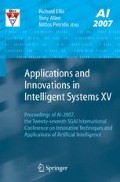Abstract
This paper describes a system which incorporates natural language technologies, database manipulation and educational theories in order to offer learners a Negotiated Learner Model, for integration into an Intelligent Tutoring System. The system presents the learner with their learner model, offering them the opportunity to compare their own beliefs regarding their capabilities with those inferred by the system. A conversational agent, or “chatbot” has been developed to allow the learner to negotiate over the representations held about them using natural language. The system aims to support the metacognitive goals of self-assessment and reflection, which are increasingly seen as key to learning and are being incorporated into UK educational policy. The paper describes the design of the system, and reports a user trial, in which the chatbot was found to support users in increasing the accuracy of their self-assessments, and in reducing the number of discrepancies between system and user beliefs in the learner model. Some lessons learned in the development have been highlighted and future research and experimentation directions are outlined.
Access this chapter
Tax calculation will be finalised at checkout
Purchases are for personal use only
Preview
Unable to display preview. Download preview PDF.
References
Bull, S. and Pain, H. Did I say what I think I said, and do you agree with me?: Inspecting and Questioning the Student Model. in World Conference on Artificial Intelligence in Education. 1995. Charlottesville, VA: AACE.
Dimitrova, V., STyLE-OLM: Interactive Open Learner Modelling. International Journal of Artificial Intelligence in Education, 2003. 13: p. 35-78.
Kay, J. Learner Know Thyself: Student Models to give Learner Control and Responsibility. in ICCE97 International Conference on Computers in Education. 1997. Kuching, Malaysia.
Morales, R., Exploring participative learner modelling and its effects on learner behaviour. 2000, University of Edinburgh: Edinburgh.
Zapata-Rivera, J.D. and Greer, J., Externalising Learner Modelling Representations, in Workshop on External Representations of AIED: Multiple Forms and Multiple Roles. Artificial Intelligence in Education. 2001: San Antonio, Texas.
Dewey, J., How We Think:A Restatement of the Relation of Reflective Thinking to the Educative Process. 1933, Boston: D. C. Heath and Company.
Schön, D., The Reflective Practitioner. 1983, London: Maurice Temple Smith Ltd.
Kolb, D., The Process of Experiential Learning, in The Experiential Learning: Experience as the Source of Learning and Development, D. Kolb, Editor. 1984, Prentice-Hall: NJ.
Papaleontiou-Louca, E., The Concept and Instruction of Metacognition. Teacher Development, 2003. 7(1): p. 9-30.
Paris, S.G. and Winograd, P., How Metacognition Can Promote Academic Learning and Instruction, in Dimensions of Thinking and Cognitive Instruction, B.F. Jones and L. Idol, Editors. 1990, Lawrence Erlbaum: Hillsdale. p. 15-51.
Butler, D.L. and Winne, P.H., Feedback and Self-Regulated Learning: A Theoretical Synthesis. Review of Educational Research, 1995. 65(3): p. 245-281.
Schoenfeld, A.H., What’s All the Fuss About Metacognition?, in Cognitive Science and Mathematics Education, A.H. Schoenfeld, Editor. 1987, Lawrence Erlbaum: Hillsdale. p. 189-215, cited by [9].
Aleven, V. and Koedinger, K. Limitations of Student Control: Do Students Know When They Need Help? in Intelligent Tutoring Systems. 2000: Springer Verlag.
Mitrovic, A. Self-assessment: how good are students at it? in AIED 2001 Workshop on Assessment Methods in Web-Based Learning Environments & Adaptive Hypermedia. 2001. San Antonio.
Black, P. and Wiliam, D., Inside the black box: raising standards through classroom assessment. 1998, London King’s College London, School of Education.
Kerly, A. and Bull, S. Open Learner Models: Opinions of School Education Professionals. in Artificial Intelligence in Education. 2007. IOS Press, Amsterdam. p. 587-589.
Bull, S., et al. Reactions to Inspectable Learner Models: Seven Year Olds to University Students. in Workshop on Learner Modelling for Reflection. International Conference on Artificial Intelligence in Education. 2005. Amsterdam.
Bull, S. and McKay, M. An Open Learner Model for Children and Teachers: Inspecting Knowledge Level of Individuals and Peers. in Intelligent Tutoring Systems: 7th International Conference. 2004. Berlin-Heidelberg: Springer Verlag.
Giraffa, L. and Viccari, R. The Use of Agents Techniques on Intelligent Tutoring Systems. in International Conference of the Chilean Computer Science Society. 1998. Antofagasta, Chile: IEEE.
Kerly, A., Hall, P. & Bull, S., Bringing Chatbots into Education: Towards Natural Language Negotiation of Open Learner Models. Knowledge Based Systems 2006. 20(2): p. 177-185.
Creative Virtual. Creative Virtual UK web site. 2004-2006 [cited 1/4/2007]; Available from: www.creativevirtual.com.
Sparck-Jones, K., Natural language processing: a historical review, in Current Issues in Computational Linguistics: in Honour of Don Walker, A. Zampolli, et al., Editors. 1994, Kluwer: Amsterdam. p. 3-16
Author information
Authors and Affiliations
Editor information
Editors and Affiliations
Rights and permissions
Copyright information
© 2008 Springer-Verlag London Limited
About this paper
Cite this paper
Kerly, A., Ellis, R., Bull, S. (2008). CALMsystem: A Conversational Agent for Learner Modelling. In: Ellis, R., Allen, T., Petridis, M. (eds) Applications and Innovations in Intelligent Systems XV. SGAI 2007. Springer, London. https://doi.org/10.1007/978-1-84800-086-5_7
Download citation
DOI: https://doi.org/10.1007/978-1-84800-086-5_7
Publisher Name: Springer, London
Print ISBN: 978-1-84800-085-8
Online ISBN: 978-1-84800-086-5
eBook Packages: Computer ScienceComputer Science (R0)

